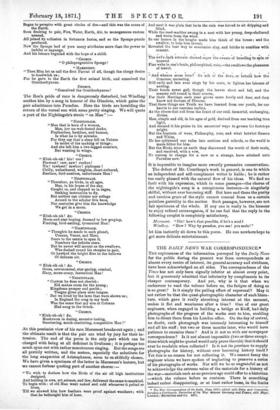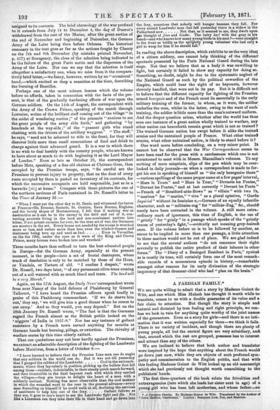THE DAILY NEWS WAR CORRESPONDENCE.* THE copiousness of the information
purveyed by the Daily News for the public during the present war from correspondents at almost every centre of interest, its general accuracy and vividness, have been acknowledged on all sides. The correspondence of the Times has not only been signally inferior at almost every point, but it generously admitted that inferiority by compliments to its cheaper contemporary. And yet, why is it that when we endeavour to read the volume before us, the fatigue of doing so is so great? Is it simply the palling effect of reperusal? May it not rather be that the quasi-photographic character of such litera- ture, which gave it really absorbing interest at the moment, makes it flat and wearisome after a time ? One of our great engineers, when engaged in building a bridge at Kieff, bad daily photographs of the progress of the works sent to him, enabling him to direct them from his London office. On the day of arrival, no doubt, each photograph was intensely interesting to himself and all his staff ; but two or three months later, who would have patience to examine them ? And is it not so with our newspaper correspondence ? Is it not almost impossible (two or three except- tions which might be quoted would only prove the rule) that it should ever be readable when collected ? Is it not its province to supply photographs for history, without ever becoming history itself ? Yet this is no reason for not collecting it. We cannot fancy the engineer whom we have spoken of neglecting to preserve a series of his photographs of works. Nor will we be so ungrateful as not to acknowledge the extreme value of the materials for a history of the war—materials such as no previous age could offer to a historian —which the volume before us contains. There is something indeed rather disappointing, or at least rather loose, in the limits * The ll'or Correspondence of the Daily News, 1870; edited with Nola and Comments, forming a Continuous Narrative of the War between Germany and Prance, with Maps.. London : Macmillan and Co. 1871,
assigned to its contents. The brief chronology of the war prefixed
to it extends from July 14 to December 4, the day of Ducrot's withdrawal from the east of the Marne, after the great sorties of the end of November and beginning of December, the German
Army of the Loire being then before Orleans. The historical summary in the text goes as far as the actions fought by Chanzy on the 7th and 8th December (by mistake printed November, p. 417) at Beaugency, the close of the selection being indicated to be the failure of the great Paris sortie and the dispersion of the Army of the Loire. Nor can we say that the selection is itself altogether a satisfactory one, when we miss from it the compara- tively brief letter,—We fancy, however, written by an "occasional " hand,—which excited so deep a sensation at the time, describing the burning of Bazeilles.
Perhaps one of the most solemn lessons which the volume before us affords, taken in connection with the facts of the pre- sent, is that of the gradually hardening effects of war upon the German soldiers. On the 14th of August, the correspondent with the Army of the Crown Prince, speaking of the march through Lorraine, writes of the brilliant staff coming out of the village " in the midst of wondering rustics ;" of the peasants "anxious to see the great people of the army ride forth," and gathering " by hundreds at the way-side ;" of the " peasant girls who stand chatting with the drivers of the artillery waggons." " The staff," he says, "need not be ashamed to ride to the front, for they will discover little more than small annexations of food and drink to charge against their advanced guard. It is a war in which there is no wish to deal harshly with the country people, who are known to have about as much to do with beginning it as the Lord Mayor of London." Even as late as October 23, the correspondent before Metz, speaking of a fine old château at Château-Gras, then occupied by the Prussian troops, says, " So careful are the Prussians to prevent injury to property, that on the door of every room occupied by them is pasted an inventory of its contents, for which the successive occupants are held responsible, just as in a barracks [sic] at home." Compare with these pictures the one of the northern environs of Paris contained in Dr. Russell's letter to the Times of January 26 :—
" When I went out the other day to St. Denis, and witnessed the havoc at Franeonville, Ermont. Saunois, St. Gratien, Eaux. Bonnes, Enghien, and the lovely slopes of Montmorency, I felt that if making war as destructive as it can be to the enemy in the field and out of it, con- verting neutrals living in the land and non-combatant natives into bitter, if not potent enemies for ever, be the true art of war, the Germans are masters in the art. Every house not needed by the troops is wrecked more or less, and rather more than less, even the window-frames and staircases being torn up and used as fuel Even in Versailles, on the the 19th, under the eyes as it were of the King and Crown Prince, many houses were broken into and wrecked."
Three months have thus sufficed to turn the best educated people in Europe—for the German Army, especially at the present moment, is the people—into a set of brutal destroyers, whose track of desolation is only to be matched by those of the Huns, or Vandals, or Tartars of old. " I confess I despair," wrote Dr. Russell, two days later, " of any permanent olive-trees coming out of a soil watered with so much blood and tears. The land will be a very March."
Again, on the 17th August, the Daily News' correspondent wrote from near Nancy of the bold defence of Phalsbourg by General Talhouet, " I have heard the Prussian officers speak loudly in praise of this Phalsbourg commandant. 'If we do starve him out,' they say, we will give him a good dinner when he comes to our camp.' And so they would, you may depend." But on the
28th January Dr. Russell wrote, "The fact is that the Germans regard the French almost as the British public looked on the niggers' of India in 1857-8." Nor has any instance of gallant resistance by a French town earned anything for months at
German hands but burning, pillage, or extortion. The chivalry of warfare seems by this time utterly extinct.
That our quotations may not bear hardly against the Prussians, we extract an admirable description of the fighting of the Landwehr before Maizieres, from a letter of October 8 :—
" I have learned to believe that the Prussian Line men can do aught that any soldiers in the world can do. But it was not till yesterday that I gauged the calibre of the Landwehr Cool in the entrench- ments, where they lay calmly in position, picking up the bullets that fell among them—resolute, indomitable, in their steady quick march forward, and then irresistible in the final bayonet rush with which they carried the villages—they are troops to delight the heart of a man with a soldierly instinct. Nothing was more observable than the cool manner in which the wounded went to the rear in the general advance—every man depending on himself if he could walk at all, declining the services of assistants to help him out of the fray Gallant fellows as they are, it goes to one's heart to see the Landwehr fight and die. Not like a Linesman can they take their life in their hand and go down into
the fray, conscious that nobody will hunger because they fall. For every second Landwehr man that fell yesterday there is a widow in the
Fatherland now Not that, as it seemed to me, they dwelt upon the thought of frau and kinder. The hairy kerl with the grey in his beard—and who knows how many young birds in his nest ?—went straight to the front as boldly as the sprightly young volunteer who had only a girl to weep for him if he should fall."
In reading the above description, which exhibits to us the very ideal of a citizen soldiery, one cannot help thinking of the different spectacle presented by the Paris National Guard during the late siege. Not that we believe that as a body it was unwilling to fight, but certainly it failed to show any capacity for doing so.
Something, no doubt, might be due to the systematic neglect of the National Guard as such by the political cowardice of the Empire, which could bear the sight of no bayonets, however slovenly handled, that were not in its pay. But it is difficult not to believe that the different capacity for fighting of the Prussian armed bourgeois and of the French must lie essentially in the early military training of the former, in whom, as it were, the soldier underlies the man, whilst in the latter, owing to the want of such training, the soldier is little more than the man's outward uniform.
And the deeper question arises, whether after the world has thus• seen one instance of a great nation wholly trained to warfare, any other nation can henceforth remain great which is not so trained ? The trained German nation has swept before it alike the trained armies and the untrained people of France. What other trained armies, what other untrained nation, is likely to stand before it?
One word more before concluding, on a very minor point. It. cannot but be observed that the War Correspondence seems to-
have been read for the press with a carelessness which one is not accustomed to meet with in Messrs. Macmillan's volumes. To say nothing of mere misprints, slips of the pen which may be over- looked in daily journals—as when a correspondent is made to for- get his sex in speaking of himself as " the only bourgeoise there" —various spellings of the same proper name at a few pages' interval, " Mars le Tours " and " Mars la Tour," " Devants lea Pontse,"' "Devant les Poutse," and at last correctly " Devant lea Ponta" —French of " Stratford-atte-Bowe " as " villain " with two l's, " marines " for " marina," " vive " as a plural optative, " Garde- Imperial" without its feminine e,—German of an equally infantile- character, such as " militaire-zug " for " &c., should surely have been corrected in the volume. A still more extra-
ordinary mark of ignorance, this time of English, is the use of- " grizzly " for " grisly " in a passage which speaks of the " grizzly' traces of yesterday's fight,"—evidently not meaning grey-bairedi
ones. If the volume before us is to be followed by another, as seems to be implied in more than one passage, a little attention to these matters would not be out of place. We are glad indeed to see that the several authors " do not renounce their right- severally to publish the entire product of their labours in other- forms." The " Diary of a Besieged Resident in Paris," cynical as is mostly its tone, will certainly form one of the most remark- able records of a momentous episode in history,—remarkable amongst other reasons for its early divination of the strategic- impotency of that dreamer-chief who had " plan on the brain."



































 Previous page
Previous page